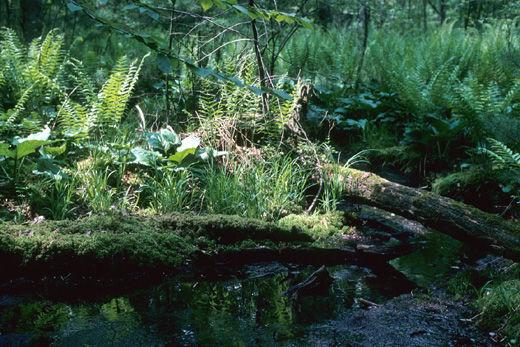Nestled near a former cranberry bog in rural Monroe County, Wis., there is an unusual 16.25-acre untouched patch of land. It’s a dark, damp place, where ferns, skunk cabbage and sedge take root in sandy soil, shaded by towering red maples, eastern white pines, tamarack, yellow birch and black ash trees. The Department of Natural Resources (DNR) has designated the site as an “imperiled” white pine and red maple Swamp, one of only a handful left in Wisconsin.
“DNR has classified white pine-red maple swamps as being under severe threat,” explains Clean Wisconsin staff attorney Evan Feinauer. “This is a high-quality and rare type of wetland.”
Despite the special designation by its own ecologists, the DNR granted a wetland-fill permit for the area in 2017 to Atlanta-based Meteor Timber, allowing the company to cut down the trees and fill in groundwater flows and streams. Clearing the land would make way for a $75 million frac sand loading facility, allowing the company to transport sand from a mine in western Wisconsin down to natural gas fracking sites in Texas.
“They want to mine the sand in Jackson County, put it on giant trucks, and drive it to Monroe County, where they will load it onto trains at this new transloading facility to be built along the existing Union Pacific rail line,” Feinauer says. “It’s a perfect example of trying to destroy something that we need, this untouched pristine wetland, to facilitate fossil fuel infrastructure that we don’t need and that’s making our climate problems even worse.”
Clean Wisconsin and the Ho-Chunk Nation sued the DNR in 2017 to block the permit and ultimately won. Meteor Timber appealed that decision to Monroe County Circuit Court, and in September of 2020, Clean Wisconsin and the Ho-Chunk Nation won again. The Georgia company has since taken the case to the Court of Appeals, where another ruling is expected on December 16.
Feinauer acknowledges it has taken years of work protect the small, largely unseen wetland that sits on private property, a place few people will ever visit.
“When you think of Wisconsin’s natural treasures, this place probably doesn’t come to mind because it’s so rare and so inaccessible. But these wetlands develop over hundreds, if not thousands, of years, and this one is on the verge of being destroyed. Clean Wisconsin and the Ho-Chunk Nation have to step in to preserve it,” he says.
Clean Wisconsin staff scientist Paul Mathewson says the rare swamp is a relic of an older Wisconsin, one that existed before half of the state’s wetlands were lost to urbanization and agricultural development in the past century.
“We lost so many of our wetlands, we have to work to protect every bit that we can now, even this relatively small bit,” Mathewson explains. “Protection is particularly important when it comes to rare wetlands like this one, since diversity of our landscape is key to resilience in the face of climate change.”
He ticks off the many benefits of wetlands—protecting from floods, soaking up rainfall to replenish aquifers and maintain water levels in rivers and streams, wildlife habitat, storing carbon, even filtering harmful pollutants out of water.
“Nitrates, for example, are the most widespread groundwater contaminant in the state,” Mathewson says. “One of the proposed solutions for nitrate pollution is for farmers to build artificial wetlands along field edges as a way of filtering out those pollutants that natural wetlands used to filter out, but those natural places aren’t there anymore.”
In Monroe County, Meteor Timber has proposed building new, artificial wetlands to replace the natural one it wants to destroy. But Mathewson cautions that there is no way to fully replace any natural wetland, let alone one as rare as a White Pine-Red Maple swamp.
“It takes so much time for land to build up as a wetland and provide all those environmental benefits. Research shows that artificial wetlands just can’t perform as many functions,” he says. “Even for the functions they do have, they don’t perform as well as natural wetlands. So it’s not as easy as saying, ‘We’ll just make more.’”

